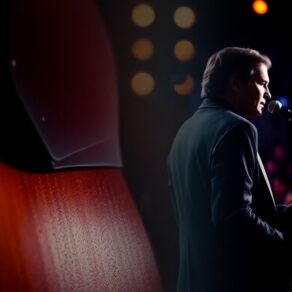As a busy musician, you've got to juggle practice, work, and creativity. Start by prioritizing your practice schedule, using tools to manage your time effectively. Incorporate mindfulness techniques to keep your focus sharp and reduce stress. Don't forget to warm up efficiently before performances to enhance your readiness. Balance your work and music commitments by setting boundaries and learning to say no. Explore networking opportunities to connect with other musicians and share ideas. Invest in quality gear that boosts your performance and inspires confidence. Stay inspired by seeking new creative outlets. Stick around to discover even more tips tailored for you!
Key Takeaways
- Optimize practice schedules by setting clear goals and identifying daily time pockets for consistent, focused sessions.
- Incorporate mindfulness techniques, such as breathing exercises and meditation, to enhance focus and reduce performance anxiety.
- Prioritize quality gear and equipment to improve sound, playability, and overall performance confidence.
- Engage in networking opportunities through local shows, social media, and music groups to foster collaborations and community support.
- Embrace the creative journey by accepting lows and exploring diverse art forms to reignite inspiration and maintain artistic flow.
Prioritize Your Practice Schedule
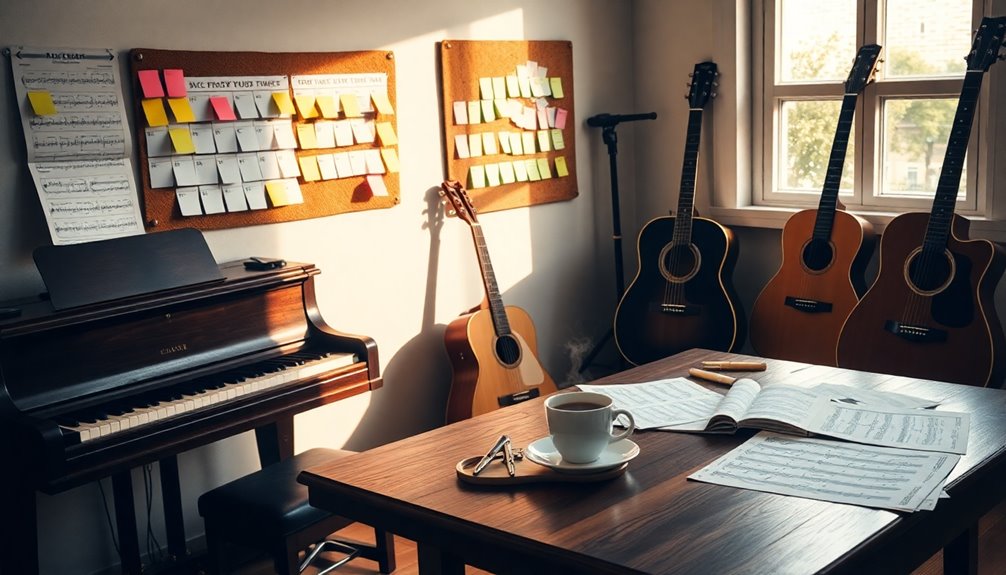
To make the most of your time as a busy musician, you need to prioritize your practice schedule. It's easy to let your practice session slip through the cracks when you're juggling gigs, rehearsals, and life's demands. By implementing effective time management strategies, you can carve out dedicated practice time that fits into your hectic lifestyle.
Start by setting clear practice goals. Decide what you want to focus on during each session—whether it's mastering a new piece, improving your technique, or working on improvisation skills. Having specific outcomes in mind helps you stay motivated and makes your practice sessions more productive.
Next, evaluate your daily routine. Identify pockets of time that you can dedicate to practice. It could be early in the morning, during lunch breaks, or late at night. Whatever works for you, make it a non-negotiable part of your day.
Consider using a planner or a digital tool to schedule your practice sessions. Block out those times just like you'd for a meeting or a gig. Consistency is key; even short, focused practice periods can lead to significant progress over time. Incorporating a structured daily practice schedule can further enhance the effectiveness of your practice.
Finally, don't forget to be flexible. Life can throw curveballs, and that's okay! Allow yourself the grace to adjust your schedule as needed.
Incorporate Mindfulness Techniques

Incorporating mindfulness techniques into your daily routine can transform your musical journey. When you embrace practices like breathing exercises and meditation, you create a space for clarity and focus that enhances your creativity and performance. It's about finding that calm center amidst the chaos of rehearsals, gigs, and daily life.
Start with simple breathing exercises. Take a few moments each day to focus solely on your breath. Inhale deeply through your nose, filling your lungs, then exhale slowly through your mouth. This not only calms your mind but also grounds you, allowing you to approach your music with fresh energy and perspective. Regular practice of breath control exercises can further enhance your musical skills and overall effectiveness.
Try this before practice or a performance to help center your thoughts and reduce anxiety.
In addition to breathing exercises, explore meditation practices. Even just five to ten minutes can make a significant difference. Find a comfortable spot, close your eyes, and focus on your breath or a calming mantra.
As you settle into the moment, you'll notice distractions fading away. This practice sharpens your concentration, making it easier to immerse yourself in your music with intention.
Utilize Efficient Warm-Up Routines
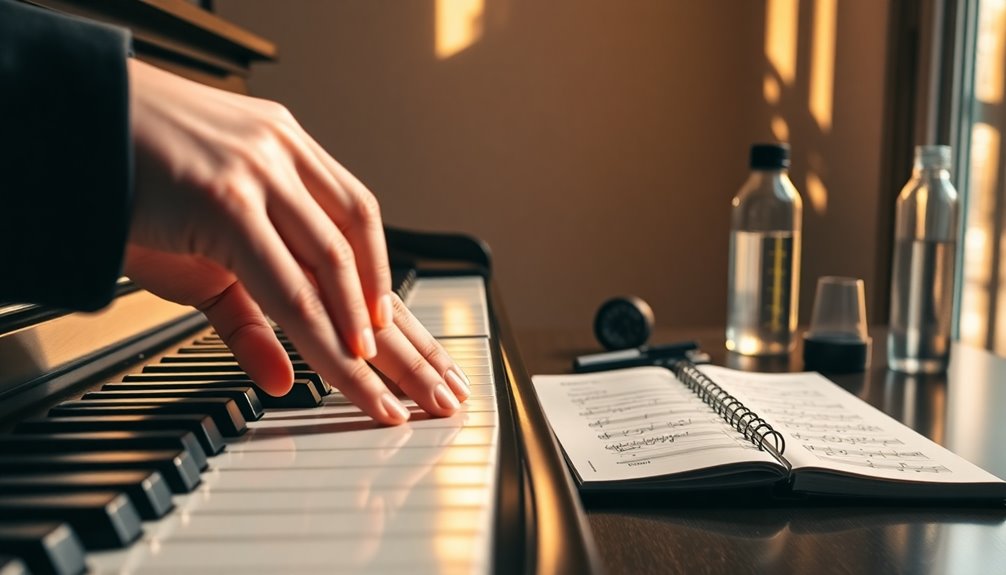
Efficiency is key when it comes to warm-up routines for busy musicians. You know that every minute counts, so let's make the most of your warm-up time. A quick, effective routine not only prepares your body and mind but also keeps you engaged and ready to perform.
Here's a streamlined approach to get you started:
- Dynamic Stretches: Begin with a few dynamic stretches to get your blood flowing. Think arm circles, leg swings, or torso twists. These movements warm up your muscles and improve your range of motion, making it easier to play.
- Breathing Exercises: Next, incorporate some breathing exercises. Deep, controlled breaths help center your mind and calm pre-performance jitters. Try inhaling for four counts, holding for four, and exhaling for six. This simple technique can enhance your focus and is similar to mastery of breath control which is crucial for sustaining notes.
- Instrument-Specific Warm-ups: Spend a few minutes on scales or short pieces that focus on technique. Pick a couple of challenging passages to help you feel confident as you play.
- Cool Down: After your session, don't skip the cool-down! A few gentle stretches or breathing exercises help your body recover and prevent injury, leaving you ready for your next gig.
Balance Work and Music Commitments
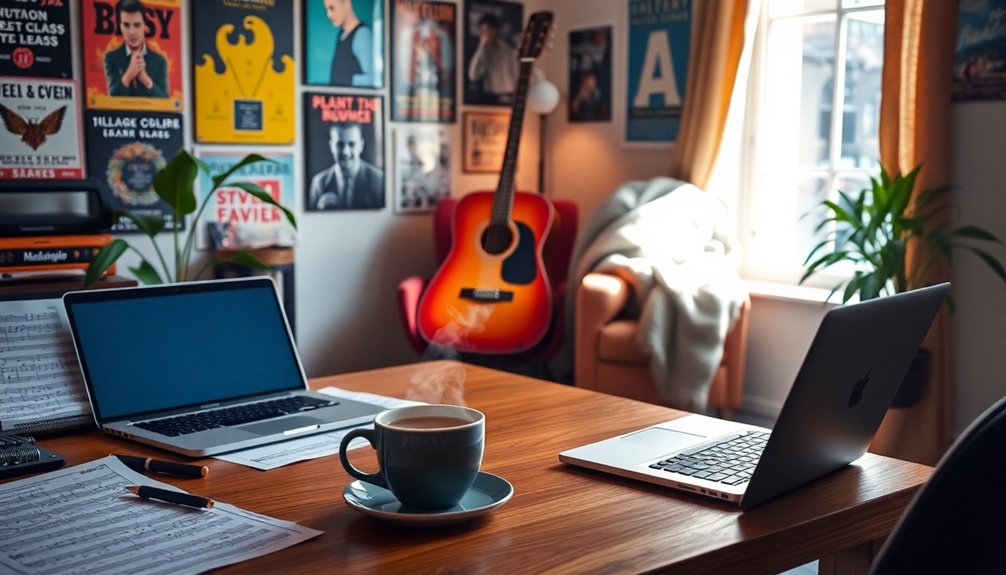
Finding the right balance between work and music commitments can feel like juggling multiple tasks at once. You might often feel stretched thin, trying to meet deadlines while also squeezing in rehearsals or songwriting sessions. With effective time management and commitment strategies, you can harmonize your work and music life without losing your mind.
Start by prioritizing your tasks. Identify what's urgent and what can wait. Use a simple table to visualize your commitments:
| Task | Due Date | Priority Level |
|---|---|---|
| Work Project A | MM/DD | High |
| Music Rehearsal | MM/DD | Medium |
| Songwriting Session | MM/DD | Low |
By categorizing your commitments this way, you can focus on what truly matters. Create a weekly schedule that allocates specific time blocks for work and music. For example, mornings could be dedicated to your day job, while evenings can be reserved for practice or gigs.
Don't shy away from setting boundaries, either. Let colleagues and bandmates know your availability. This transparency fosters understanding and keeps everyone on the same page. Remember, it's okay to say no sometimes—your passion for music deserves your full attention when you're engaged. Incorporating essential flute practice tools can also enhance your practice sessions, making the most of your limited time.
Ultimately, balancing work and music is about finding what works best for you. With the right strategies in place, you can thrive in both arenas. Embrace the journey; you're not alone in this!
Explore Networking Opportunities

Networking opportunities can open doors and create valuable connections in the music industry, enhancing your career prospects.
As a busy musician, it's crucial to make the most of these opportunities to grow your network and collaborate with others. Here are some practical ways to engage in networking:
- Attend Local Shows: Go to gigs, open mics, and music festivals. Not only will you enjoy the performances, but you'll also meet fellow musicians and industry professionals who can inspire collaborative projects.
- Leverage Social Media: Platforms like Instagram, Facebook, and Twitter are goldmines for connecting with other artists. Share your music, engage with others' content, and don't hesitate to slide into DMs to introduce yourself.
- Join Music Groups: Whether online or in-person, find communities that align with your musical interests. These groups often share opportunities, tips, and support, making it easier to find potential collaborators. Additionally, actively engaging in ensemble dynamics can create lasting friendships and enhance your collaborative efforts.
- Participate in Workshops: Look for workshops or seminars in your area. Not only will you learn something new, but you'll also meet like-minded musicians who are enthusiastic to collaborate on projects.
Invest in Quality Gear
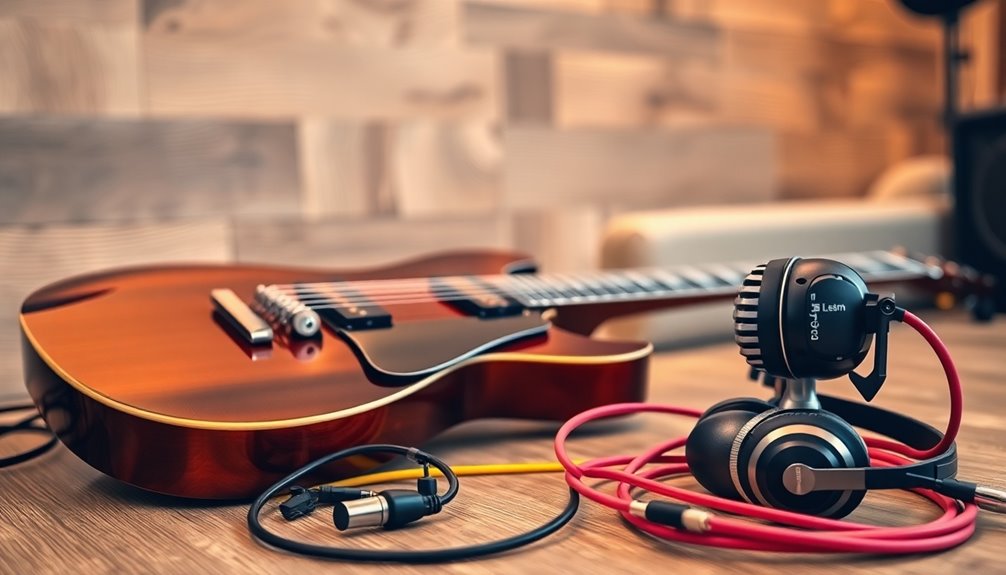
Investing in quality gear, like premium instruments and smart accessories, can make a significant difference in your music production and performance. When you play an instrument that resonates with your style and passion, it elevates your creativity and boosts your confidence.
Think about your sound: Are you getting the most from your current gear? Sometimes, upgrading to premium instruments can enhance your tone and playability, allowing you to express yourself more authentically. Brands like Yamaha and Pearl are known for their exceptional craftsmanship and sound quality, making them popular choices among serious musicians.
Whether it's a guitar that feels just right in your hands or a keyboard that inspires new melodies, quality matters. Smart accessories also play an essential role in your workflow. From reliable cables to effective pedals, these tools can streamline your setup and guarantee you're ready to go whenever inspiration strikes.
Don't underestimate the power of a good microphone or a sturdy stand; they can drastically improve your recording quality and stage presence.
Stay Inspired and Creative
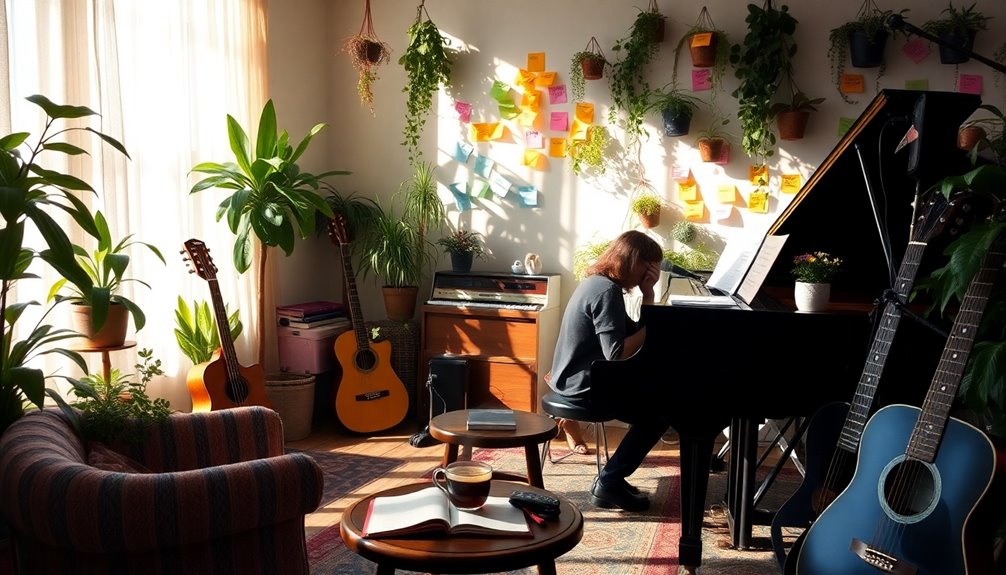
Everyone faces creative blocks from time to time, but staying inspired is essential for any musician. You need to keep the creative juices flowing, especially when life gets busy. Here are some practical tips to help you rediscover your spark:
- Explore Creative Outlets: Don't limit yourself to just music. Try painting, writing, or photography. Engaging in different forms of art can ignite new ideas and perspectives in your music.
- Seek Artistic Collaboration: Connecting with other musicians can be incredibly revitalizing. Collaborate on a song, or simply jam together. Sharing ideas and experiences can breathe new life into your creativity.
- Set Aside 'Me Time': Carve out some quiet moments for yourself. Whether it's a walk in nature or a few minutes of meditation, this time alone can help clear your mind and inspire new thoughts.
- Consume Diverse Art: Read books, watch films, or listen to different genres of music. Exposure to various art forms can inspire your own work and push you to experiment with new styles.
Structured content in your practice, like focusing on scales and arpeggios, can also enhance your creativity and technical skills as a musician.
Staying inspired is a journey, not a destination. Embrace these strategies, and remember, it's okay to feel uninspired sometimes. It's all part of being a musician.
Surround yourself with creativity, and you'll find your way back to the music that makes you feel alive.
Frequently Asked Questions
How Can I Find Time for Personal Relationships While Being Busy?
Finding time for personal relationships while juggling a busy schedule can be tough, but it's all about relationship balance and effective time management.
Start by prioritizing your loved ones; schedule regular catch-ups just like you'd for work commitments. Use small pockets of time—like during breaks or commutes—to check in.
Being present, even briefly, strengthens connections. Remember, nurturing these relationships enriches your life and keeps you grounded amid your busy days.
What Are Quick Meal Prep Tips for Musicians on the Go?
You're juggling rehearsals and gigs, but that doesn't mean you can't eat well. Meal planning is your best friend.
Spend a couple of hours on the weekend prepping healthy snacks like veggie sticks and hummus or energy bites. Package them in grab-and-go containers, so you've always got something nutritious on hand.
A little effort now means you'll fuel your busy days and keep your energy high, letting you focus on what you love most—music!
How Do I Manage Stage Fright Before Performances?
Managing stage fright can be tough, but you can tackle it with a few strategies.
Start with breathing exercises to calm your nerves; inhale deeply, hold for a moment, then exhale slowly. This helps center your mind.
Pair that with positive affirmations—tell yourself you're ready and capable.
What Are Effective Ways to Stay Organized With Music Projects?
Are you drowning in a sea of unfinished tracks and chaotic ideas? It doesn't have to be this way.
Embrace project management techniques that can transform your creative chaos into structured bliss. Utilize digital tools like Trello or Asana to organize your tasks, set deadlines, and track progress.
You'll feel a sense of belonging to a community of organized creators, achieving your goals while keeping your passion alive.
Don't wait; start organizing today!
How Can I Maintain My Physical Health as a Musician?
Maintaining your physical health is essential for your overall well-being. Start by incorporating exercise routines that you enjoy, whether it's dancing, jogging, or yoga. This keeps your body active and boosts your energy levels.
Don't forget about mental wellness; practices like meditation or journaling can help you manage stress.
Conclusion
In the whirlwind of your musical journey, remember that you're the conductor of your own orchestra. By prioritizing your practice, embracing mindfulness, and striking a balance between work and creativity, you'll create harmony in your life. Don't forget to invest in quality gear and explore networking opportunities to keep your passion alive. Stay inspired, and let your unique melody shine through. With these tips, you'll not only survive but thrive in the bustling world of music!


